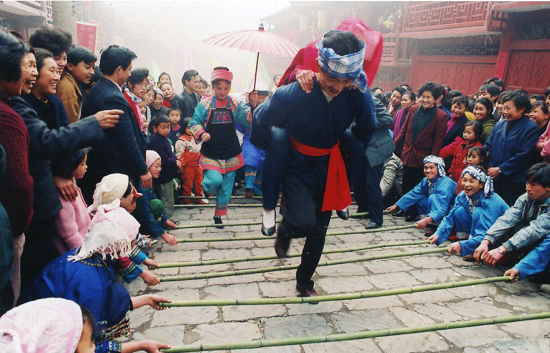Under the feudal system of the past, a Bouyei youth’s love life entirely depended on the discretion of their parents as almost all marriages were arranged. Fortunes appear to have changed for the Bouyei, as now they are largely allowed to marry for love! Nowadays fairs and festivals provide the perfect opportunity for unmarried men and women to mingle, sing songs together, and find a suitable partner.
If a woman is attracted to a man, she will often throw a ball to him made of silk strips, which she will have embroidered herself. This indicates that the man is free to pursue her and, if the man returns her affections, he will ask her on a date. Bouyei men are no strangers to romance, as these dates are almost exclusively spent singing love songs! After several of these songful dates, the couple will usually announce their engagement.
There is also a popular folk tale in Bouyei literature about how women should choose which man to marry. First a young woman must sew seven bags, each about ten inches long, with large fabric handles. She must then fill each bag with a different grain; one with long grain rice, one with glutinous rice, one with millet, one with rice bran, and so on. After preparing all these bags, one could even say the woman had become a cereal filler!
At an appropriate time, the girl would then pitch the bags out to her suitors, or suitor if she wasn’t all that lucky, and ask them to pick one up. The man who selected the bag full of rice bran was the one she should marry, as this was the gods’ way of indicating he was a diligent and honest man. Though this custom isn’t taken seriously, it is sometimes still practised today as a bit of fun.
 Bouyei weddings are two or three day affairs with much singing, dancing, and delicious food. The Bouyei often marry very young and it is commonplace for children as young as twelve to already be married! However, directly after the wedding the wife will return to her parents’ home and this arrangement usually carries on for 3 to 5 years, but can be extended to 7 or 8 years!
Bouyei weddings are two or three day affairs with much singing, dancing, and delicious food. The Bouyei often marry very young and it is commonplace for children as young as twelve to already be married! However, directly after the wedding the wife will return to her parents’ home and this arrangement usually carries on for 3 to 5 years, but can be extended to 7 or 8 years!
The wife will only go to live with her husband on one of three conditions; when her parents decide; when she becomes pregnant with her first child; or when she elects to wear a special hat known as a jiagu[1]. Customarily, once the jiagu has been worn, the wife must return to her husband’s home, so women are sometimes the target of sneaky hat attacks!
In the area near Mount Biandan, Guizhou province, they practice a custom every year during April, August or September where the man’s mother and sister, or two of his female relatives, will bring a chicken and a jiagu to his wife’s home. While they are there, they will sneakily try to unclasp her hair and put the jiagu on her head! If they are successful, she must return with them to her husband’s home. If not, they have to try again another time. In some cases, it is also acceptable for the husband to simply creep up on his wife and un-braid her hair. We’re not sure how all of these sneaky customs came to be, but we can’t imagine it inspires much trust between husbands and wives!
[1] Jiagu: A special headdress made by wrapping decorative fabric around a bamboo shell-shaped frame.
